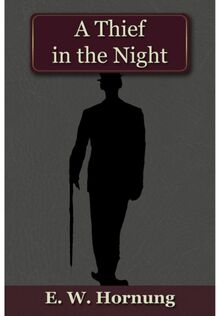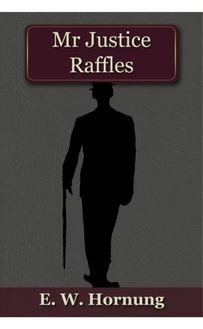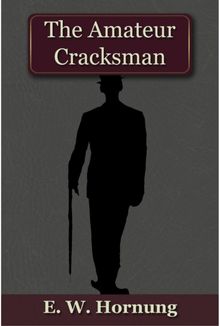Mr Justice Raffles , livre ebook
103
pages
English
Ebooks
2011
Vous pourrez modifier la taille du texte de cet ouvrage
Obtenez un accès à la bibliothèque pour le consulter en ligne En savoir plus
Découvre YouScribe et accède à tout notre catalogue !
Découvre YouScribe et accède à tout notre catalogue !
103
pages
English
Ebooks
2011
Vous pourrez modifier la taille du texte de cet ouvrage
Obtenez un accès à la bibliothèque pour le consulter en ligne En savoir plus
Publié par
Date de parution
19 juillet 2011
Nombre de lectures
0
EAN13
9781849895453
Langue
English
Title Page
MR JUSTICE RAFFLES
By
E.W. Hornung
Publisher Information
This electronic version published in 2011 by
Andrews UK Limited
www.andrewsuk.com
This edited version, including layout, typography, additions to text, cover artwork and other unique factors is copyright Andrews UK 2011. No part of this digital publication may be reproduced, stored in a retrieval system or transmitted in any form or by any means electronic, mechanical, photocopying, recording or otherwise without written permission of the copyright owner.
An Inaugural Banquet
Raffles had vanished from the face of the town, and even I had no conception of his whereabouts until he cabled to me to meet the 7.31 at Charing Cross next night. That was on the Tuesday before the ‘Varsity match, or a full fortnight after his mysterious disappearance. The telegram was from Carlsbad, of all places for Raffles of all men! Of course there was only one thing that could possibly have taken so rare a specimen of physical fitness to any such pernicious spot. But to my horror he emerged from the train, on the Wednesday evening, a cadaverous caricature of the splendid person I had gone to meet.
“Not a word, my dear Bunny, till I have bitten British beef!” said he, in tones as hollow as his cheeks. “No, I’m not going to stop to clear my baggage now. You can do that for me to-morrow, Bunny, like a dear good pal.”
“Any time you like,” said I, giving him my arm. “But where shall we dine?
Kellner’s? Neapolo’s? The Carlton or the Club?”
But Raffles shook his head at one and all.
“I don’t want to dine at all,” he said. “I know what I want!”
And he led the way from the station, stopping once to gloat over the sunset across Trafalgar Square, and again to inhale the tarry scent of the warm wood-paving, which was perfume to his nostrils as the din of its traffic was music to his ears, before we came to one of those political palaces which permit themselves to be included in the list of ordinary clubs. Raffles, to my surprise, walked in as though the marble hall belonged to him, and as straight as might be to the grill-room where white-capped cooks were making things hiss upon a silver grill. He did not consult me as to what we were to have. He had made up his mind about that in the train. But he chose the fillet steaks himself, he insisted on seeing the kidneys, and had a word to say about the fried potatoes, and the Welsh rarebit that was to follow. And all this was as uncharacteristic of the normal Raffles (who was least fastidious at the table) as the sigh with which he dropped into the chair opposite mine, and crossed his arms upon the cloth.
“I didn’t know you were a member of this place,” said I, feeling really rather shocked at the discovery, but also that it was a safer subject for me to open than that of his late mysterious movements.
“There are a good many things you don’t know about me, Bunny,” said he wearily. “Did you know I was in Carlsbad, for instance?”
“Of course I didn’t.”
“Yet you remember the last time we sat down together?”
“You mean that night we had supper at the Savoy?”
“It’s only three weeks ago, Bunny.”
“It seems months to me.”
“And years to me!” cried Raffles. “But surely you remember that lost tribesman at the next table, with the nose like the village pump, and the wife with the emerald necklace?”
“I should think I did,” said I; “you mean the great Dan Levy, otherwise
Mr. Shylock? Why, you told me all about him, A. J.”
“Did I? Then you may possibly recollect that the Shylocks were off to Carlsbad the very next day. It was the old man’s last orgy before his annual cure, and he let the whole room know it. Ah, Bunny, I can sympathise with the poor brute now!”
“But what on earth took you there, old fellow?”
“Can you ask? Have you forgotten how you saw the emeralds under their table when they’d gone, and how I forgot myself and ran after them with the best necklace I’d handled since the days of Lady Melrose?”
I shook my head, partly in answer to his question, but partly also over a piece of perversity which still rankled in my recollection. But now I was prepared for something even more perverse.
“You were quite right,” continued Raffles, recalling my recriminations at the time; “it was a rotten thing to do. It was also the action of a tactless idiot, since anybody could have seen that a heavy necklace like that couldn’t have dropped off without the wearer’s knowledge.”
“You don’t mean to say she dropped it on purpose?” I exclaimed with more interest, for I suddenly foresaw the remainder of his tale.
“I do,” said Raffles. “The poor old pet did it deliberately when stooping to pick up something else; and all to get it stolen and delay their trip to Carlsbad, where her swab of a husband makes her do the cure with him.”
I said I always felt that we had failed to fulfil an obvious destiny in the matter of those emeralds; and there was something touching in the way Raffles now sided with me against himself.
“But I saw it the moment I had yanked them up,” said he, “and heard that fat swine curse his wife for dropping them. He told her she’d done it on purpose, too; he hit the nail on the head all right; but it was her poor head, and that showed me my unworthy impulse in its true light, Bunny. I didn’t need your reproaches to make me realise what a skunk I’d been all round. I saw that the necklace was morally yours, and there was one clear call for me to restore it to you by hook, crook, or barrel. I left for Carlsbad as soon after its wrongful owners as prudence permitted.”
“Admirable!” said I, overjoyed to find old Raffles by no means in such bad form as he looked. “But not to have taken me with you, A. J., that’s the unkind cut I can’t forgive.”
“My dear Bunny, you couldn’t have borne it,” said Raffles solemnly. “The cure would have killed you; look what it’s done to me.”
“Don’t tell me you went through with it!” I rallied him.
“Of course I did, Bunny. I played the game like a prayer-book.”
“But why, in the name of all that’s wanton?”
“You don’t know Carlsbad, or you wouldn’t ask. The place is squirming with spies and humbugs. If I had broken the rules one of the prize humbugs laid down for me I should have been spotted in a tick by a spy, and bowled out myself for a spy and a humbug rolled into one. Oh, Bunny, if old man Dante were alive to-day I should commend him to that sink of salubrity for the redraw material of another and a worse Inferno!”
The steaks had arrived, smoking hot, with a kidney apiece and lashings of fried potatoes. And for a divine interval (as it must have been to him) Raffles’s only words were to the waiter, and referred to successive tankards of bitter, with the superfluous rider that the man who said we couldn’t drink beer was a liar. But indeed I never could myself, and only achieved the impossible in this case out of sheer sympathy with Raffles. And eventually I had my reward, in such a recital of malignant privation as I cannot trust myself to set down in any words but his.
“No, Bunny, you couldn’t have borne it for half a week; you’d have looked like that all the time!” quoth Raffles. I suppose my face had fallen (as it does too easily) at his aspersion on my endurance. “Cheer up, my man; that’s better,” he went on, as I did my best. “But it was no smiling matter out there. No one does smile after the first week; your sense of humour is the first thing the cure eradicates. There was a hunting man at my hotel, getting his weight down to ride a special thoroughbred, and no doubt a cheery dog at home; but, poor devil, he hadn’t much chance of good cheer there! Miles and miles on his poor feet before breakfast; mud-poultices all the morning; and not the semblance of a drink all day, except some aerated muck called Gieshübler. He was allowed to lap that up an hour after meals, when his tongue would be hanging out of his mouth. We went to the same weighing machine at cock-crow, and though he looked quite good-natured once when I caught him asleep in his chair, I have known him tear up his weight ticket when he had gained an ounce or two instead of losing one or two pounds. We began by taking our walks together, but his conversation used to get so physically introspective that one couldn’t get in a word about one’s own works edgeways.”
“But there was nothing wrong with your works,” I reminded Raffles; he shook his head as one who was not so sure.
“Perhaps not at first, but the cure soon sees to that! I closed in like a concertina, Bunny, and I only hope I shall be able to pull out like one. You see, it’s the custom of the accursed place for one to telephone for a doctor the moment one arrives. I consulted the hunting man, who of course recommended his own in order to make sure of a companion on the rack. The old arch-humbug was down upon me in ten minutes, examining me from crown to heel, and made the most unblushing report upon my general condition. He said I had a liver! I’ll swear I hadn’t before I went to Carlsbad, but I shouldn’t be a bit surprised if I’d brought one back.”
And he tipped his tankard with a solemn face, before falling to work upon the Welsh rarebit which had just arrived.
“It looks like gold, and it’s golden eating,” said poor old Raffles. “I only wish that sly dog of a doctor could see me at it! He had the nerve to make me write out my own health-warrant, and it was so like my friend the hunting man’s that it dispelled his settled gloom for the whole of that evening. We used to begin our drinking day at the same well of German damnably defiled, and we paced the same colonnade to the blare of the same well-fed band. That wasn’t a



